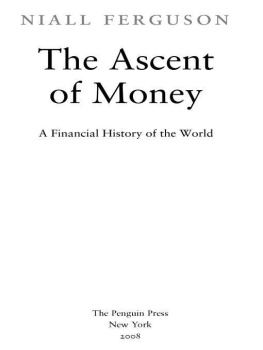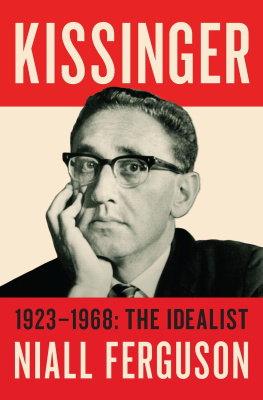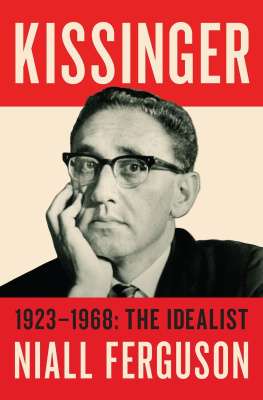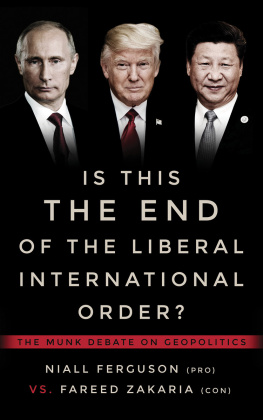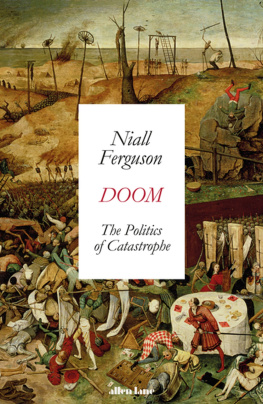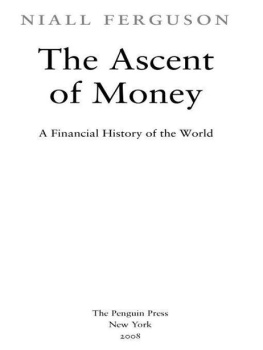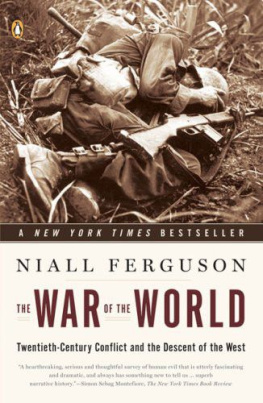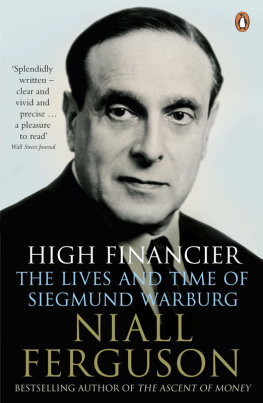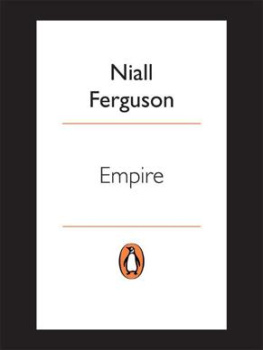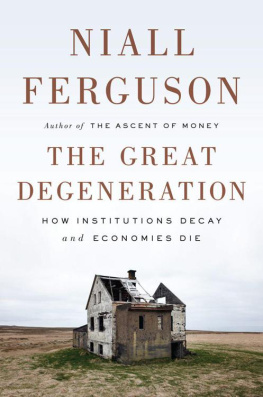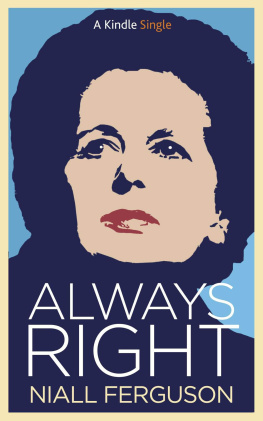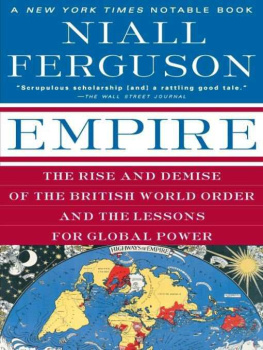Table of Contents
ALSO BY NIALL FERGUSON
Paper and Iron
The House of Rothschild
The Pity of War
The Cash Nexus
Empire
Colossus
The War of the World

THE PENGUIN PRESS
Published by the Penguin Group
Penguin Group (USA) Inc., 375 Hudson Street,
New York, New York 10014, U.S.A.
Penguin Group (Canada), 90 Eglinton Avenue East, Suite 700,
Toronto, Ontario, Canada M4P 2Y3
(a division of Pearson Penguin Canada Inc.)
Penguin Books Ltd, 80 Strand, London WC2R 0RL, England
Penguin Ireland, 25 St. Stephens Green, Dublin 2, Ireland
(a division of Penguin Books Ltd)
Penguin Books Australia Ltd, 250 Camberwell Road, Camberwell,
Victoria 3124, Australia
(a division of Pearson Australia Group Pty Ltd)
Penguin Books India Pvt Ltd, 11 Community Centre, Panchsheel Park,
New Delhi110 017, India
Penguin Group (NZ), 67 Apollo Drive, Rosedale, North Shore 0632,
New Zealand (a division of Pearson New Zealand Ltd)
Penguin Books (South Africa) (Pty) Ltd, 24 Sturdee Avenue,
Rosebank, Johannesburg 2196, South Africa
Penguin Books Ltd, Registered Offices:
80 Strand, London WC2R 0RL, England
First published in 2008 by The Penguin Press,
a member of Penguin Group (USA) Inc.
Copyright Niall Ferguson, 2008
All rights reserved
eISBN : 978-1-440-65401-5
Without limiting the rights under copyright reserved above, no part of this publication may be reproduced, stored in or introduced into a retrieval system, or transmitted, in any form or by any means (electronic, mechanical, photocopying, recording or otherwise), without the prior written permission of both the copyright owner and the above publisher of this book.
The scanning, uploading, and distribution of this book via the Internet or via any other
means without the permission of the publisher is illegal and punishable by law. Please
purchase only authorized electronic editions and do not participate in or encourage electronic
piracy of copyrightable materials. Your support of the authors rights is appreciated.
http://us.penguingroup.com
Introduction
Bread, cash, dosh, dough, loot, lucre, moolah, readies, the where-withal: call it what you like, money matters. To Christians, the love of it is the root of all evil. To generals, it is the sinews of war; to revolutionaries, the shackles of labour. But what exactly is money? Is it a mountain of silver, as the Spanish conquistadors thought? Or will mere clay tablets and printed paper suffice? How did we come to live in a world where most money is invisible, little more than numbers on a computer screen? Where did money come from? And where did it all go?
Last year (2007) the income of the average American (just under $34,000) went up by at most 5 per cent.
Angry that the world is so unfair? Infuriated by fat-cat capitalists and billion-bonus bankers? Baffled by the yawning chasm between the Haves, the Have-nots - and the Have-yachts? You are not alone. Throughout the history of Western civilization, there has been a recurrent hostility to finance and financiers, rooted in the idea that those who make their living from lending money are somehow parasitical on the real economic activities of agriculture and manufacturing. This hostility has three causes. It is partly because debtors have tended to outnumber creditors and the former have seldom felt very well disposed towards the latter. It is partly because financial crises and scandals occur frequently enough to make finance appear to be a cause of poverty rather than prosperity, volatility rather than stability. And it is partly because, for centuries, financial services in countries all over the world were disproportionately provided by members of ethnic or religious minorities, who had been excluded from land ownership or public office but enjoyed success in finance because of their own tight-knit networks of kinship and trust.
Despite our deeply rooted prejudices against filthy lucre, however, money is the root of most progress. To adapt a phrase from Jacob Bronowski (whose marvellous television history of scientific progress I watched avidly as a schoolboy), the ascent of money has been essential to the ascent of man. Far from being the work of mere leeches intent on sucking the lifes blood out of indebted families or gambling with the savings of widows and orphans, financial innovation has been an indispensable factor in mans advance from wretched subsistence to the giddy heights of material prosperity that so many people know today. The evolution of credit and debt was as important as any technological innovation in the rise of civilization, from ancient Babylon to present-day Hong Kong. Banks and the bond market provided the material basis for the splendours of the Italian Renaissance. Corporate finance was the indispensable foundation of both the Dutch and British empires, just as the triumph of the United States in the twentieth century was inseparable from advances in insurance, mortgage finance and consumer credit. Perhaps, too, it will be a financial crisis that signals the twilight of American global primacy.
Behind each great historical phenomenon there lies a financial secret, and this book sets out to illuminate the most important of these. For example, the Renaissance created such a boom in the market for art and architecture because Italian bankers like the Medici made fortunes by applying Oriental mathematics to money. The Dutch Republic prevailed over the Habsburg Empire because having the worlds first modern stock market was financially preferable to having the worlds biggest silver mine. The problems of the French monarchy could not be resolved without a revolution because a convicted Scots murderer had wrecked the French financial system by unleashing the first stock market bubble and bust. It was Nathan Rothschild as much as the Duke of Wellington who defeated Napoleon at Waterloo. It was financial folly, a self-destructive cycle of defaults and devaluations, that turned Argentina from the worlds sixth-richest country in the 1880s into the inflation-ridden basket case of the 1980s.
Read this book and you will understand why, paradoxically, the people who live in the worlds safest country are also the worlds most insured. You will discover when and why the English-speaking peoples developed their peculiar obsession with buying and selling houses. Perhaps most importantly, you will see how the globalization of finance has, among many other things, blurred the old distinction between developed and emerging markets, turning China into Americas banker - the Communist creditor to the capitalist debtor, a change of epochal significance.
At times, the ascent of money has seemed inexorable. In 2006 the measured economic output of the entire world was around $47 trillion. The total market capitalization of the worlds stock markets was $51 trillion, 10 per cent larger. The total value of domestic and international bonds was $68 trillion, 50 per cent larger. The amount of derivatives outstanding was $473 trillion, more than ten times larger. Planet Finance is beginning to dwarf Planet Earth. And Planet Finance seems to spin faster too. Every day two trillion dollars change hands on foreign exchange markets. Every month seven trillion dollars change hands on global stock markets. Every minute of every hour of every day of every week, someone, somewhere, is trading. And all the time new financial life forms are evolving. In 2006, for example, the volume of leveraged buyouts (takeovers of firms financed by borrowing) surged to $753 billion. An explosion of securitization, whereby individual debts like mortgages are tranched then bundled together and repackaged for sale, pushed the total annual issuance of mortgage backed securities, asset-backed securities and collateralized debt obligations above $3 trillion. The volume of derivatives - contracts derived from securities, such as interest rate swaps or credit default swaps (CDS) - has grown even faster, so that by the end of 2007 the notional value of all over-the-counter derivatives (excluding those traded on public exchanges) was just under $600 trillion. Before the 1980s, such things were virtually unknown. New institutions, too, have proliferated. The first hedge fund was set up in the 1940s and, as recently as 1990, there were just 610 of them, with $38 billion under management. There are now over seven thousand, with $1.9 trillion under management. Private equity partnerships have also multiplied, as well as a veritable shadow banking system of conduits and structured investment vehicles (SIVs), designed to keep risky assets off bank balance sheets. If the last four millennia witnessed the ascent of man the thinker, we now seem to be living through the ascent of man the banker.

